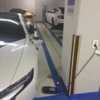Actually I was thinking about Airbnb so that's why I said "publicly traded" (even though Uber isn't publicly traded). I just wanted to emphasize how rare it is for a company to be 2-3x revenue annually when they're revenue is already in the billions of dollars per year. It doesn't happen very often. And when it does it's something to pay attention to.
By the way I think Airbnb's revenue is not growing 2x per year... it was about 90% annual increase between 2013-2015. But I really like Airbnb and
I've been following them and other high-growth startups for years.
Actually in China I think they fought well. They were a bit late and China just had too strong of a company, Didi Kuaidi (after they merged), that was backed by basically unlimited money and also some of the biggest tech companies in China. They did well enough to be a strong 2nd place. But in Uber's case, they didn't see a future in being 2nd in what Uber is viewing a "winner-takes-all" market... thus they sold.
If Uber would have been able to become the dominant China player, then Uber's valuation would probably be $100 billion right now or so. But they failed.
Also in South Korea, if they didn't get banned they probably would have become the dominant player in the ride-sharing business. I don't necessarily agree with it, but Uber tends to break the law (which they view as archaic and not serving the consumers), then try to fix the law. But in South Korea that approach backfired. They lost South Korea due to this.
But in the 70+ countries that Uber operates in, I'm not sure how countries they're in 2nd place. It would be interesting to find out. My guess is the vast majority, they are 1st.
Actually, I think it's the reverse... typically Uber faces it's most litigation and resistant in the beginning. However, after they saturate a market, they usually get the laws changed/revised and they're able to operate in those countries much more freely.
But I do agree that each market is independent. Thus, Uber can win one market, and lose another. This does give an opening to Tesla if they can focus on one market (ie., one location, or one segment) and beat Uber in that segment (ie., kind of like how Tesla started with the Roadster)... then Tesla might have a chance, but it's an uphill battle.
Regarding driver subsidies, typically Uber only subsidizes because the competition is subsidizing. Supposedly Uber claims they learned the subsidy model from their experience in China where the competition was subsidizing like crazy.
But that just goes to show that these companies are clamoring over market share because they think that once they get dominant market share, they can then enjoy the fruits of that position (ie., volume and the competitive advantage that brings).
I don't think Uber lost China or South Korea because they didn't have a messaging app or peer-to-peer banking. For China, they were late and got out-subsidized by bigger pockets. In South Korea, they were banned/sued.
But I think you're general point being can be applied to Tesla as well. In markets like China and South Korea, how is Tesla going to successfully launch and grow a ride-sharing service with such strong existing dominant players?





